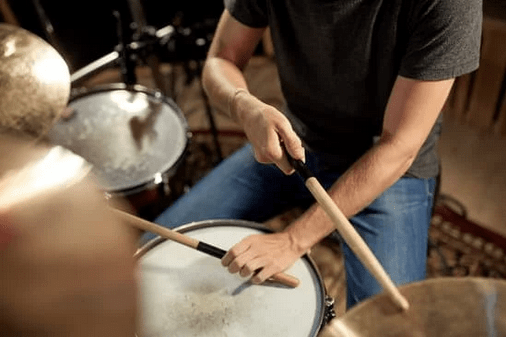Drumming is more than just making music. It's a powerful tool that can boost our brain power and help us think better. When we drum, we use different parts of our brain at the same time. This helps our brain work better as a whole.

Drumming can make us smarter by improving our memory, focus, and problem-solving skills. It's not just for kids either. People of all ages can get brain benefits from drumming. Even older adults can keep their minds sharp by picking up drumsticks and tapping out some beats.
Drumming is also good for our mood and stress levels. It can help us feel happier and more relaxed. Plus, when we drum with others, it helps us connect and work together better. This makes drumming a fun and helpful activity for our brains and our social lives.
Key Takeaways
- Drumming activates multiple brain areas, boosting overall cognitive function
- Rhythm-based activities can improve memory, focus, and problem-solving skills
- Drumming offers benefits for all ages, from children to older adults
Foundations of Rhythm and Cognitive Function
Rhythm and drumming have powerful effects on our brains. They activate many brain areas and can improve how we think and move.
Understanding Rhythm and Brain Activation
Rhythm engages multiple parts of our brains at once. When we drum or listen to rhythmic beats, it activates regions involved in hearing, movement, and emotion. The repetitive patterns of drumming create neural connections between different brain areas.
This increased brain activity can boost our focus and memory. Studies show that people who regularly practice rhythm activities often have better attention spans. They can also process information more quickly.
Drumming lights up our motor cortex, which controls movement. It also activates the cerebellum, important for coordination and timing. Even our prefrontal cortex gets involved, helping with planning and decision-making.
The Role of Drumming in Enhancing Motor Skills
Drumming is great for improving our motor skills. It requires precise movements and timing, which strengthens the connection between our brains and muscles.
Regular drumming practice can lead to:
- Better hand-eye coordination
- Improved fine motor control
- Faster reaction times
- Enhanced balance and posture
These benefits come from the repeated motions involved in drumming. Each time we hit a drum, we're training our brains to time movements more accurately.
Drumming also helps with bilateral coordination. This means using both sides of our body together smoothly. It's a skill that's useful in many daily activities.
For kids, drumming can be especially helpful. It supports the development of motor skills during crucial growth periods. This can have lasting effects on their physical abilities.
Drumming and Cognitive Development in Children

Drumming offers exciting benefits for kids' brains. It can boost thinking skills and help with learning. Let's look at how drumming impacts children's minds.
Boosting IQ and Academic Performance
Studies show that drumming can raise IQ scores in children. Kids who drum regularly often do better in school. They tend to get higher grades in subjects like math and reading.
Drumming helps kids learn patterns and rhythms. This skill carries over to other areas. It can improve memory and problem-solving abilities.
We've seen that drumming programs in schools lead to better test scores. Kids who drum also show more creativity in their schoolwork.
Stimulating Neurodevelopment and Attention Span
Drumming is great for brain growth in kids. It creates new connections between brain cells. This helps with learning and memory.
Children with ADHD often benefit from drumming. It can increase focus and reduce fidgeting. The rhythm and beat help calm the mind.
We've found that drumming improves hand-eye coordination. It also boosts fine motor skills. These are key for writing and other tasks.
Drumming engages many parts of the brain at once. This full-brain workout strengthens neural pathways. It can lead to better overall brain function in children.
Cognitive Health Benefits for Adults and Older Adults

Drumming offers valuable cognitive benefits for adults and seniors. It can help preserve brain function and serve as a therapeutic tool for mental health.
Preserving Cognitive Function Through Aging
As we age, staying mentally active becomes crucial. Drumming provides both mental and physical stimulation that can help maintain cognitive health. Studies show that rhythmic activities like drumming can improve memory, attention, and processing speed in older adults.
Regular drumming practice engages multiple brain areas, strengthening neural connections. This "brain workout" may help slow cognitive decline and even boost mental sharpness. Drumming also enhances hand-eye coordination and fine motor skills, which often decline with age.
A key advantage of drumming is its accessibility. Adults of all ages and abilities can participate and reap the cognitive rewards. Even simple rhythmic exercises done seated can provide benefits.
Drumming as a Therapeutic Tool for Mental Health
Beyond cognitive function, drumming shows promise as a therapeutic tool for mental health. The rhythmic nature of drumming can reduce stress and anxiety. It provides an outlet for self-expression and emotional release.
Group drumming creates social connections, combating isolation common in older adults. This social aspect, combined with the physical activity, can lift mood and ease depression symptoms. The focus required for drumming also promotes mindfulness, helping quiet racing thoughts.
For adults dealing with trauma or PTSD, drumming offers a non-verbal way to process emotions. The repetitive movements can have a calming effect on the nervous system. Drumming's versatility makes it adaptable to various therapeutic settings and individual needs.
Social and Emotional Aspects of Drumming

Drumming brings people together in powerful ways. It helps us connect with others and express our feelings. Group drumming can build social bonds and reduce stress.
Fostering Social Connection and Cooperation
Drumming activities encourage teamwork. When we drum together, we learn to listen and respond to each other. This builds trust and understanding in the group.
Group drumming teaches us to work as a team. We have to sync up our rhythms and follow a shared beat. This helps us practice cooperation skills.
Drumming circles create a sense of community. People from different backgrounds can come together through a shared love of rhythm. This breaks down social barriers.
Emotional Expression and Stress Relief in Group Settings
Hitting a drum gives us a healthy outlet for emotions. We can express joy, anger, or sadness through our playing. This can be very freeing.
The physical act of drumming releases tension in our bodies. The repetitive motions help us relax and let go of stress.
Group drumming creates a supportive space to open up. We often feel more comfortable sharing in a drum circle. The shared experience brings people closer.
Drumming produces feel-good brain chemicals like endorphins. This boosts our mood and eases anxiety. Many people find drumming very calming.
Enhancing Cognitive Abilities Through Drumming

Drumming boosts brain power in many ways. It helps us think better, remember more, and make smarter choices. Let's look at how drumming sharpens our minds and improves our mental skills.
Improving Concentration, Memory, and Decision-Making
Drumming makes our brains work harder. When we drum, we use many parts of our brain at once. This helps us focus better and pay attention longer. Our memory gets stronger too. We learn to remember beat patterns and rhythms. This trains our working memory, which we use for many daily tasks.
Drumming also helps us make choices faster. We have to decide quickly which drum to hit next. This quick thinking carries over to other areas of life. We get better at solving problems on the spot.
• Boosts focus and attention span • Strengthens working memory • Speeds up decision-making • Improves problem-solving skills
Drumming Performance and Cognitive Enhancement
Playing drums in front of others pushes our brains even more. We have to stay focused while others watch. This builds our concentration skills. We also learn to think ahead and plan our drumming. This helps us in other tasks where we need to plan and organize.
Drum performances require good timing. We must keep the beat steady and hit the right drums at the right moments. This trains our brain to be more precise. It helps us manage our time better in daily life too.
• Builds concentration under pressure • Improves planning and organizing skills • Enhances timing and precision • Helps with time management
Drumming together with others adds more benefits. We learn to listen closely and work as a team. This makes us better at working with others in any setting.
Frequently Asked Questions
Drumming offers many benefits for cognitive development and brain function. It can boost mental health, enhance memory and focus, and support child development through rhythmic activities.
What are the benefits of rhythmic drumming for mental health?
Drumming can reduce stress and anxiety. It releases feel-good chemicals in the brain like endorphins and dopamine. This helps improve mood and emotional well-being.
Drumming in groups also promotes social connection. It can decrease feelings of loneliness and isolation.
How does rhythmic drumming contribute to cognitive enhancement?
Rhythmic drumming improves focus and concentration. It engages multiple brain areas at once, enhancing neural connections.
Drumming also boosts memory skills. Learning and repeating rhythmic patterns strengthens recall abilities.
In what ways does drumming influence child development?
Drumming helps children develop motor skills and coordination. It improves their ability to focus and follow instructions.
Rhythmic activities support language development in kids. They learn to recognize and create patterns, which aids reading and speech.
What scientific research supports the cognitive benefits of drumming?
Studies show drumming increases activity in brain regions linked to memory and learning. Research finds it can boost IQ scores in children.
Brain scans reveal drumming activates areas involved in problem-solving and decision-making.
How can drumming be incorporated into therapeutic practices for cognitive development?
Drumming circles offer a fun, social way to gain cognitive benefits. They're used in schools and community centers.
Music therapists use drumming to help patients with brain injuries or developmental disorders. It supports recovery and skill-building.
What neurological effects are associated with regular drumming activities?
Regular drumming strengthens connections between the brain's left and right hemispheres. This improves communication between different brain regions.
Drumming also increases gray matter in areas linked to self-control and focus. It can lead to lasting positive changes in brain structure and function.
DISCLAIMER
This document is provided for general information purposes only and should not be relied upon as providing legal advice, technical, or specific operational guidance to the reader, whether as to the practices described in the document or the applicable legal requirements and regulations. percussionpros.com expressly disclaims any responsibility for liability arising from or related to the use or misuse of any information in this document.







